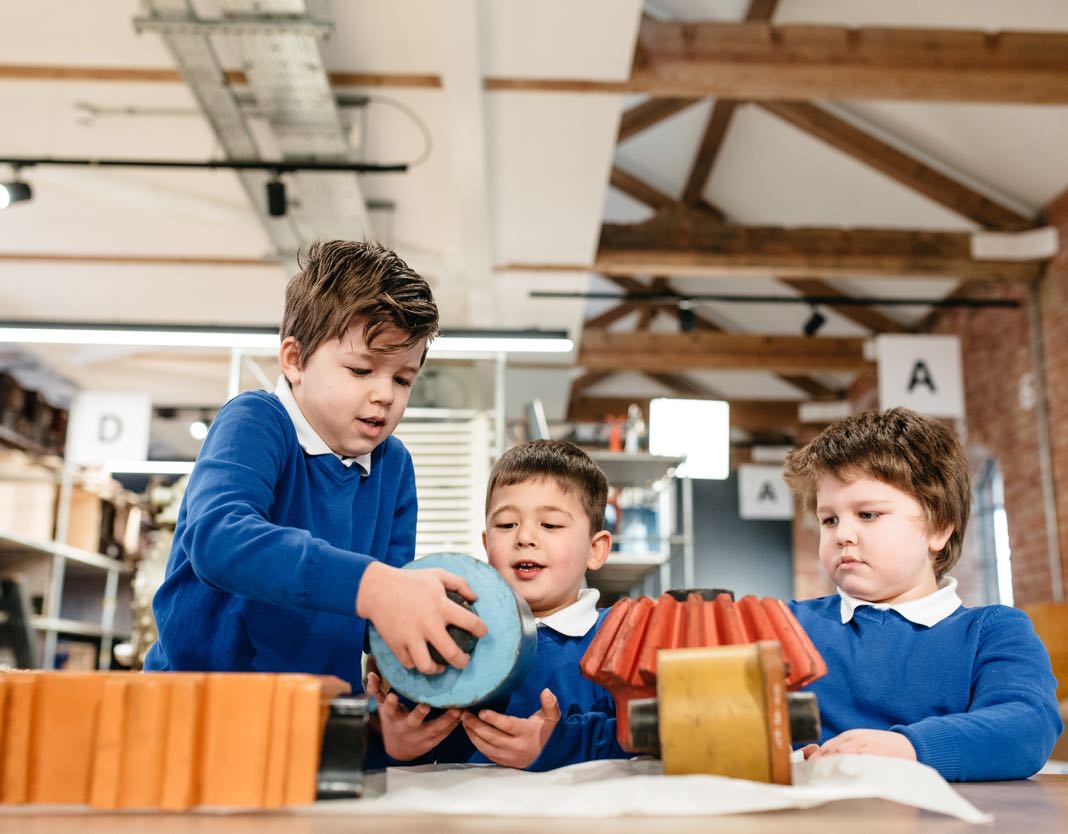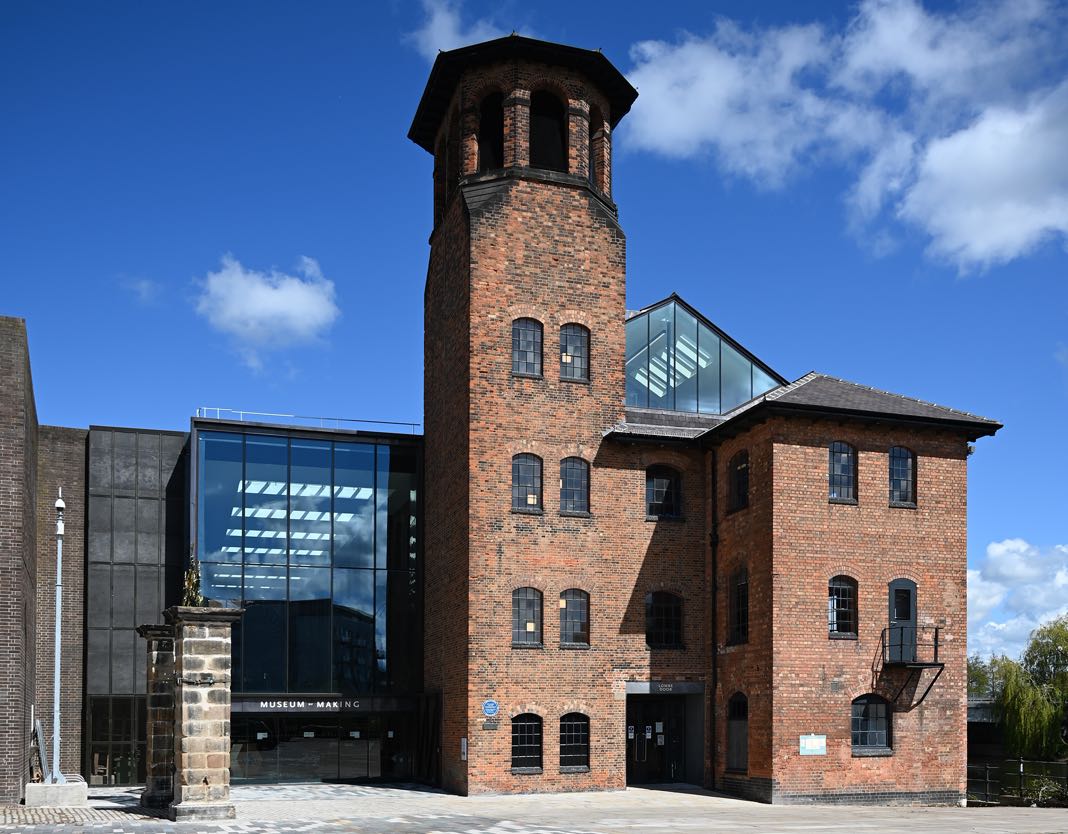Derby Silk Mill – widely regarded as the site of the world’s first modern factory – has been reborn as the new Museum of Making, and it will be throwing its doors open to visitors for the first time on Friday 21st May 2021.
The new museum, set to be a world-class visitor attraction, sits on a site of global significance within the Derwent Valley Mills UNESCO World Heritage Site, where Derby Silk Mill first stood 300 years ago. It has been developed and will be operated by Derby Museums, which secured major grant funding from The National Lottery Heritage Fund, Arts Council England, D2N2 Local Enterprise Partnership and Derby City Council. Significant support has also been received from Rolls-Royce and a range of charitable trusts and foundations.
The Museum of Making showcases a 300-year history of innovation, design and manufacturing in Derby. It also sets the context for the ‘valley that changed the world’ with the birth of the modern factory system along the River Derwent, which helped kickstart the Industrial Revolution, transforming the region into a worldwide economic powerhouse.
As well as telling the stories of Derby’s impressive past, the beating heart of the museum is a new workshop full of specialist equipment and skilled staff who are on hand to support modern makers. The Covid-19 lockdowns sparked a renewed interest in, and love for, making.

With programmes like The Repair Shop growing in popularity, the museum will harness the nation’s newfound passion for making, encouraging visitors to get creative and inspiring the next generation of innovators.
Tony Butler, Executive Director, Derby Museums said: “This is no ordinary museum. The unique Grade II listed building and all it represents is now celebrated and safeguarded. The Museum of Making tells the story of our industrial and creative past, but it is also a hub for modern makers through the facilities and support on offer.”
“The experience of visiting is designed to encourage people to understand how things are made, think about materials and their uses, have access to skills, knowledge and equipment that might otherwise be unavailable and help move mindsets from mass consumerism to sustainable production of things that are both useful and needed.”
“We hope our new museum will become a must-see destination, bringing optimism and inspiring all who visit it. Derby has been shaped by an incredible array of cultural and industrial innovations over the last 300 years, and the new Museum of Making is the exciting next chapter in the story – and one we are delighted we can now share with everyone.”
A museum with no behind the scenes
On arriving at the museum, visitors will encounter the majestic and newly renovated Grade I listed Bakewell Gates, which have stood proudly at the front of Derby Silk Mill since 1725. Visitors will then enter the new Civic Hall – a triple height glass atrium that forms the entrance to the new museum. This space had to be built around the impressive seven-tonne Rolls-Royce Trent 1,000 engine, which is suspended from the ceiling above visitors’ heads.
As well as a gallery setting the historical context of the ‘valley that changed the world’, visitors can then explore everything in the museum’s vast collection – there are no ‘behind the scenes’ areas.
To help visitors find objects that could inspire their own making, all objects in the museum’s collection are grouped around the materials from which they are predominantly made – wood, metal, ceramic, glass, stone, textile, synthetic or organic. Visitors can create their own bespoke trail through The Assemblage – picture the best antiques shop you’ve ever been in – an area home to the museum’s 30,000 objects in its collections, which are helpfully arranged on a grid system.
Through these objects and the wider Museum, visitors can explore everything from Derby’s Palaeolithic past to more modern-day feats of engineering, with exhibits including the Rolls-Royce Trent 1,000; the world’s smallest engine, run using only a human hair; the much-loved Midland Model Railway, now housed in its own exhibition space; and the iconic Silk 700S motorbike.
Throughout the galleries there are stories of making, including a video wall of modern makers talking about their work and inspiration. There is also a new gallery space which will allow the Museum of Making to host touring exhibitions. The opening exhibition explores Scale, showing the work of artists alongside intriguing objects from Derby Museums’ collection. Used in production and prototyping, in mapping and to convey perspective, scale is critical to the making process and a powerful tool in communicating ideas.
Supporting and encouraging modern-day makers
Central to the museum’s unique offering is the new Workshop, and the wider facilities and support it offers to modern makers. From high-tech to more traditional technology, The Workshop and its staff are there to support museum visitors and professionals.
A membership fee (paid monthly or annually) will give people access to the wide range of facilities on offer including lathes, computer numerical cutting (CNC) machines, welding equipment and a range of tools and benches for makers of any skill level. Anyone from furniture makers and jewellers, to engineers and entrepreneurs, will be able to become a Member of the Museum of Making to hire the facilities with support available from specialist staff.
This will also give them access to The Prospect, a new co-working space where makers can become part of a supportive community and book desk space alongside gaining access to the specialist machinery they may need. This is expected to provide a significant boost to the area’s creative enterprises, allowing, for example, the creation of prototypes without the need to invest in new equipment.
All of this is topped off with a wonderful, never-before-seen panorama from The View near the top of the museum, which overlooks the city and the wider valley beyond.
Wider support for makers includes:
- Museum of Making Membership: This will allow makers to join a creative community where they can share ideas, access peer support, learn and teach through a network of like-minded innovative people. It will be launching later in June, after the final Covid-19 restrictions are lifted. A calendar of Membership events will run throughout the year. Membership is affordably priced and will enable people to hire co-working desks in The Prospect and machinery in The Workshop, with all profits going back into running the museum and keeping it free and accessible to all.
- The Institute of STEAM: A key educational resource, created in partnership with Rolls-Royce.
- Make Works: A digital platform showcasing the work of makers in the region through a series of films made in partnership with University of Derby and Derby College Students.
- Midlands Maker Challenge: A competition for young people to come up with new ideas and solutions to problems faced by today’s society, generously supported by Midlands-based IMI plc.
The museum also boasts a new destination café, The River Kitchen, on the banks of the River Derwent, and the Museum of Making shop will showcase the work of talented makers, creators and designers from across the region. A versatile array of new venue hire spaces will cater for events from weddings and charity balls, to business meetings and conferences. These unique spaces will be available for private hire, dovetailing with the museum as a key educational and creative environment dedicated to learning, making and inspiring.
Anne Jenkins, Director, England Midlands & East, National Lottery Heritage Fund said: “It is wonderful that, thanks to National Lottery players and a Heritage Fund grant of over £10 million, we have been able to support Derby Museums in transforming Derby Silk Mill, on what is widely regarded as the site of world’s first modern factory, into an inclusive, 21st Century heritage destination.”
“At the start of this journey, Derby Silk Mill was a sleeping giant, under-appreciated and at risk. Now, the new Museum of Making is an exemplar cultural attraction that local people can be proud of, a magnet for visitors and a driver for city centre regeneration. Visitors will be enticed to learn more about Derby’s rich industrial heritage, as the museum sits proudly at the gateway to the Derwent Valley Milles UNESCO World Heritage Site.”
Peter Knott, Midlands Area Director for Arts Council England, said: “We’re really pleased to be supporting and investing in the new Museum of Making and look forward to seeing this innovative restoration celebrate Derby’s rich industrial legacy. We are proud to champion the role creativity plays in bringing history to life and hope the museum inspires local and international visitors to explore Derby’s unique heritage in a creative way for many years to come.”
David Williams, Deputy Chair of the D2N2 LEP, said: “The Museum of Making will be a world-class attraction and a must-visit destination for those in the East Midlands and beyond. It will inspire the next generation of makers and our collective ambitions to support the regeneration and growth of Derby city centre and our region’s economy.”
The museum opening also kickstarts a range of events and activities around which arts, cultural and city-wide organisations have been collaborating to help celebrate 300 years of creativity and making across the region. The ‘300’ programme – so-called to mark the momentous tri-centenary of Derby Silk Mill in 2021 – brings together events across the county, linking into the making theme.
The museum has been delivered by an Alliance Board comprising partners including Speller Metcalfe, Bauman Lyons, The Creative Core, Derry Building Services, GCAConsulting, Preston Barbar and Derby Museums, using the Integrated Project Insurance (IPI) model, facilitated by IPI Initiatives. IPI is one of the new models of procurement and construction being trialled by the Government as a way of reducing risk and Derby Museums is only the second organisation in the UK to use this construction model.
Entry to the museum is free (with the exception of special exhibitions), but due to Covid-19 restrictions tickets need to be booked in advance. To find out more and to plan your visit to the Museum of Making, click here.
